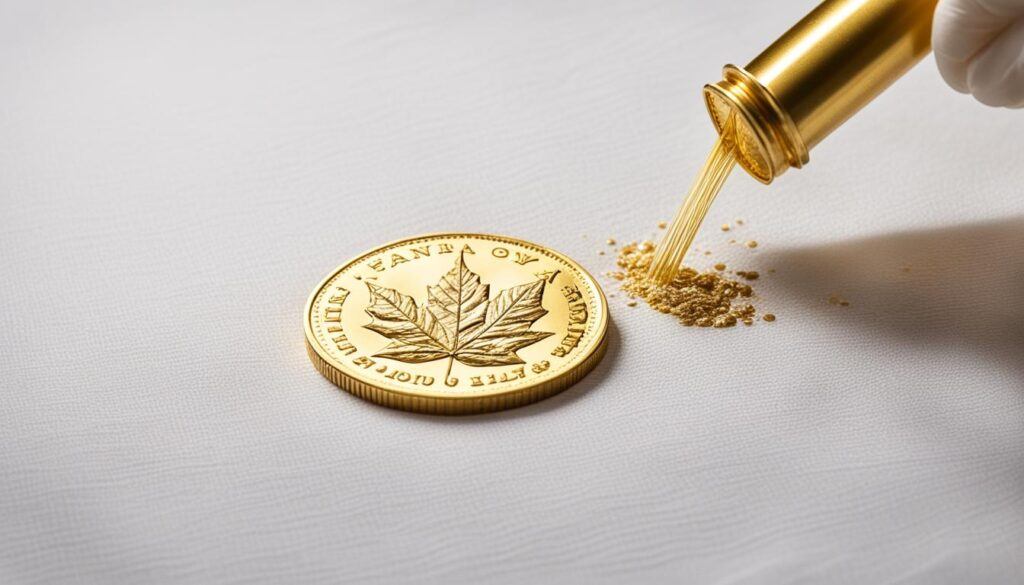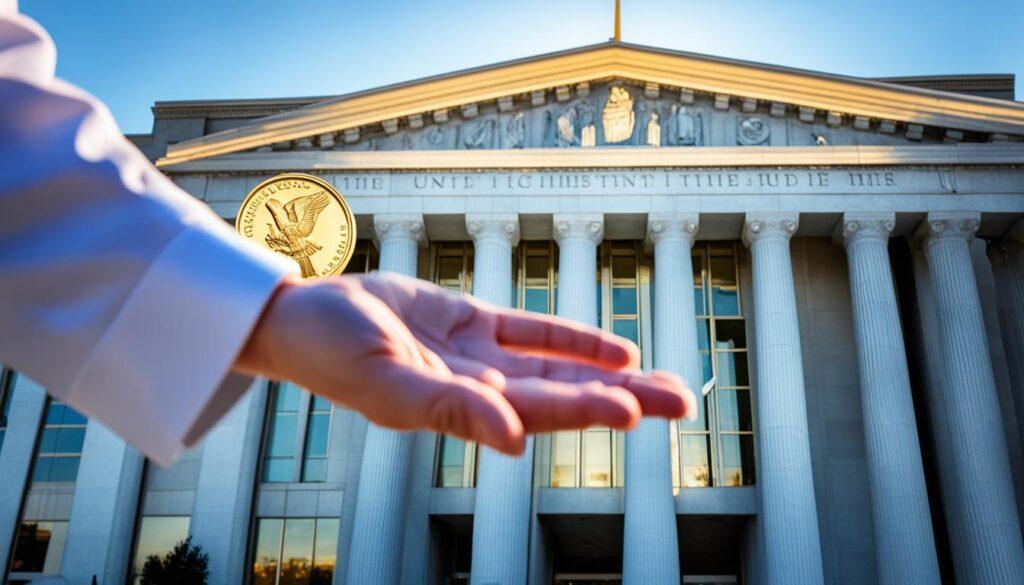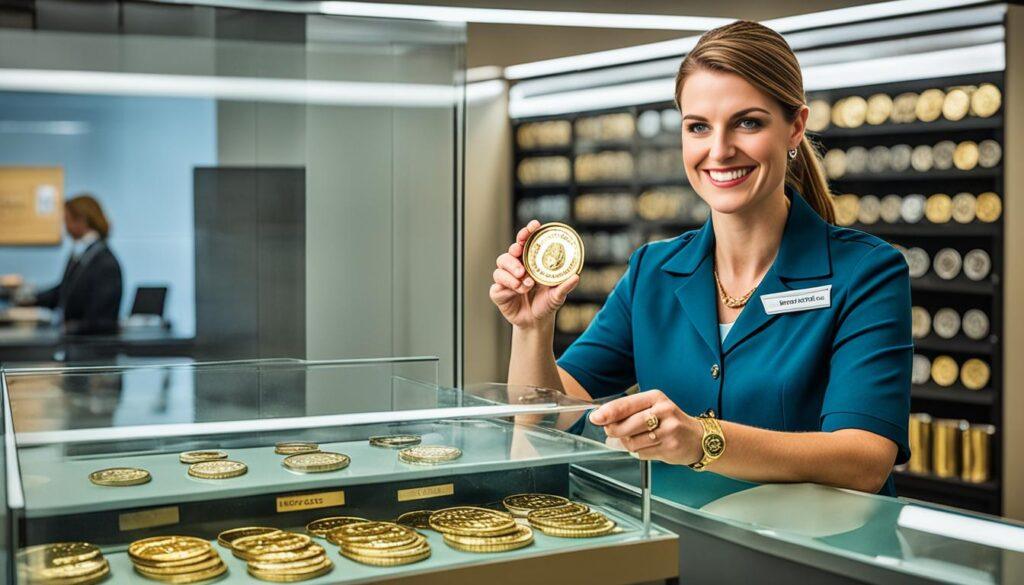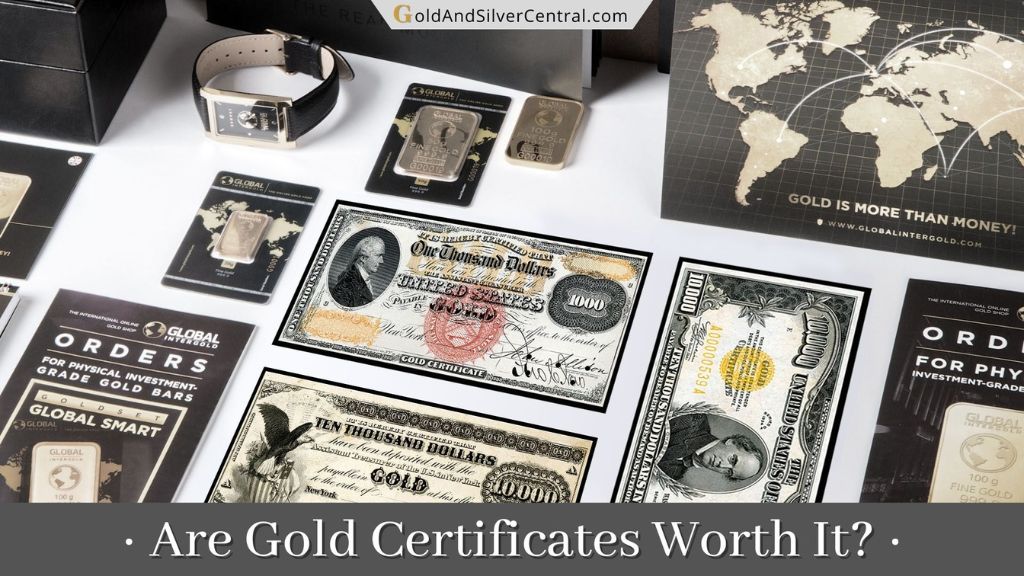Did you know that most banks in the United States do not buy or sell gold coins or other precious metals?
While some commercial banks may offer limited services for investors, the majority of banks do not have the necessary infrastructure or inventory to facilitate gold coin purchases. It is uncommon for banks to sell gold coins due to the price fluctuations and limited selection. However, there may be exceptions for high net worth individuals or longstanding clients. It is best to directly inquire with your bank to determine if they offer gold coin sales and what forms of gold they accept.
Key Takeaways:
- Most banks in the United States do not buy or sell gold coins or other precious metals.
- Some commercial banks may offer limited services for investors, but it is uncommon for banks to sell gold coins.
- Gold coin sales at banks are subject to price fluctuations and limited selection.
- Exceptions may be made for high net worth individuals or longstanding clients.
- It is best to directly inquire with your bank to determine if they offer gold coin sales and what forms of gold they accept.
What Gold Products Do Banks Accept?
While most banks do not actively buy or sell gold, some may accept certain gold products from customers. Banks typically accept gold coins in bullion form or gold bars. These forms of gold must have a letter of authenticity certificate to ensure their legitimacy. An assay or certificate of authenticity is essential when selling gold bullion to a bank. This certification confirms the purity and content of the gold.
It is important to note that the market value of gold coins and bars may exceed their face value, and it may be more beneficial to sell them to private dealers or collectors for a higher price.
| Gold Products | Accepted by Banks |
|---|---|
| Gold Bullion Coins | Yes |
| Gold Bars | Yes |
| Letter of Authenticity Certificate | Required |
| Assay or Certification | Essential |
If you are considering selling gold to a bank, ensure you have the necessary documentation and that the gold meets their criteria for acceptance.
Do Banks Accept Tarnished Gold?
The level of tarnish on gold does not significantly impact its value when selling to banks or other buyers. However, it is generally advisable to clean gold coins or bars to enhance their appearance and potentially increase their value. This is particularly relevant for bullion coins. On the other hand, rare coin collections may have a unique value that outweighs the need for cleaning. It is crucial to consider the type of gold and its individual characteristics when deciding whether or not to clean and sell it.
“The level of tarnish on gold does not significantly affect its value. Cleaning gold coins or bars can improve their appearance and potentially increase their value, especially for bullion coins. However, rare coin collections may hold intrinsic value that surpasses the importance of cleaning. The type of gold and its unique attributes should be taken into account before deciding whether or not to clean and sell.”
When it comes to selling tarnished gold to banks, it’s important to understand that the value of gold is primarily determined by its weight and purity, not its external appearance. Banks typically use standardized methods to determine the value of gold, taking into consideration the current market price and the gold’s purity. The presence of tarnish alone does not significantly affect its value in the eyes of banks or other buyers.
Cleaning gold is often recommended to potential sellers, as it can improve the overall appeal of the gold coins or bars. This is especially relevant for bullion coins, which are valued based on their gold content rather than their numismatic or collector value. Banks may prefer to purchase gold that is well-maintained and visually appealing, as it can be more easily sold or traded.
However, it’s important to approach cleaning with caution, as improper cleaning techniques or abrasive materials can damage the gold and potentially decrease its value. If you decide to clean your gold, it is advisable to use gentle methods recommended by experts, such as using warm water, mild soap, and soft brushes specifically designed for cleaning gold. Avoid using harsh chemicals or abrasive materials that could scratch or tarnish the gold further.
Gold coin value affected by tarnish? In general, the impact of tarnish on the value of gold coins is minimal, as long as the coin’s weight and purity remain intact. Minor tarnish or discoloration does not significantly affect the gold content or intrinsic value of the coin. However, excessive tarnish or damage may reduce the coin’s aesthetic appeal and potentially lower its market value.
In conclusion, while banks do not significantly consider the presence of tarnish when accepting gold, cleaning gold coins or bars can improve their appearance and potentially increase their value when selling to banks or other buyers. It is essential to ensure proper cleaning methods are used to avoid damaging the gold. Ultimately, the decision to clean or sell tarnished gold should be based on the individual characteristics of the gold and its overall condition.

Are There Taxes When You Sell Physical Gold to a Bank?
When selling physical gold, including selling it to a bank, it’s important to consider the tax implications. The IRS categorizes the profits from selling physical assets, such as gold, as capital gains, which may be subject to taxation. The actual taxable rate depends on the duration you have held the gold before selling it, and it can range up to 28%.
Consulting with a financial advisor is advisable to explore potential strategies for reducing or avoiding capital gains taxes. They can provide guidance on investment options like exchange-traded funds or mutual funds, which may offer tax advantages. Understanding IRS regulations on selling gold and staying updated on the current taxable rates is crucial to make informed decisions about selling your physical gold to a bank.
Investing in alternative assets can be a viable approach to potentially minimize the impact of capital gains taxes when selling your gold. By diversifying your portfolio, you may reap the benefits of tax-efficient investments that can help offset your tax liabilities.
“Before selling your physical gold, it’s essential to understand the tax implications and seek professional advice. Strategize your investment and tax plans to optimize your financial outcomes.”
Can You Buy Gold Coins to the U.S. Mint?
The U.S. Mint, which is responsible for producing and distributing coins in the United States, does not directly sell gold coins to private individuals. However, they collaborate with authorized distributors who are authorized purchasers of their gold products. These authorized purchasers acquire gold coins directly from the U.S. Mint and then facilitate their distribution to customers.
Unfortunately, this means that buying gold coins directly from the U.S. Mint is not possible. However, you can still explore a wide variety of gold products through the U.S. Mint’s extensive catalog. The catalog encompasses not only gold coins but also silver, platinum, and palladium bullion coins.
Alternatively, if you are interested in purchasing gold coins, you may consider reputable private dealers or companies like the Oxford Gold Group. These institutions specialize in the sale of precious metals and can provide you with a trustworthy and convenient buying experience.

Benefits of Buying Gold Coins from the U.S. Mint
While you cannot buy gold coins directly from the U.S. Mint, exploring their catalog offers several advantages. Some of the notable benefits include:
- Assurance of authenticity: The U.S. Mint’s gold coins are produced with precise standards and carry the full backing of the U.S. government.
- Wide selection: The U.S. Mint offers a diverse range of gold coins, allowing you to choose from various designs, sizes, and finishes.
- Quality assurance: The U.S. Mint’s gold coins are guaranteed to meet specific quality standards, ensuring that you receive genuine and high-quality products.
- Investment potential: Gold coins from the U.S. Mint often carry a higher premium due to their intrinsic value and the reputation associated with the Mint.
Although direct purchasing may not be available, the U.S. Mint’s catalog provides a reliable resource to explore gold coins and make informed decisions based on your preferences and investment goals.
Comparison Table: Buying Gold Coins from the U.S. Mint vs. Private Dealers
| Buying from U.S. Mint | Buying from Private Dealers | |
|---|---|---|
| Availability | Extensive catalog with various options | Wide selection from trusted dealers |
| Authenticity | Full backing of the U.S. government | Dependent on the reputation of the dealer |
| Pricing | Competitive pricing based on market rates | Pricing may vary depending on the dealer |
| Convenience | No direct purchasing; requires engagement with authorized distributors | Convenient online purchasing and shipping options |
| Expertise | No direct interaction with dealers; limited guidance available | Access to industry experts and advice |
“Exploring gold coins from the U.S. Mint’s catalog provides a gateway to the world of precious metals. While direct buying may not be possible, the authenticity, quality, and investment potential offered by the U.S. Mint’s gold coins make them an enticing option. However, purchasing from trusted private dealers also brings advantages such as convenience and guidance from industry experts.”
Can You Buy Gold From a Bank?
While central banks globally hold significant amounts of gold for various reasons, buying gold directly from banks, especially commercial banks, is uncommon. Banks typically do not have the inventory or specialized services required to facilitate gold purchases. Central banks purchase gold for purposes such as risk management, stability, and hedging against inflation.
The easiest and most convenient way to buy gold is through reputable precious metals dealers or online platforms. These dealers offer a wide selection of products, competitive pricing, secure delivery options, and expert advice.
Conclusion
When it comes to buying and selling gold coins, banks may not be the most reliable option. While some banks may offer limited services in this area, it is advisable to explore alternatives for a smoother and more convenient experience.
Reputable precious metals dealers and online platforms provide a wider selection of gold coins, competitive pricing, and expert advice. These trusted sources specialize in the buying and selling of precious metals and can ensure a seamless transaction process.
Before making any decisions, it is essential to research the current market prices, consider the potential tax implications, and consult with a financial advisor. This will help you make informed choices and maximize your investment in gold coins.
FAQ
Do banks sell gold coins?
In the United States, most banks do not buy or sell gold coins or other precious metals. While some commercial banks may offer limited services for investors, the majority of banks do not have the necessary infrastructure or inventory to facilitate gold coin purchases.
What gold products do banks accept?
Banks typically accept gold coins in bullion form or gold bars. These forms of gold must have a letter of authenticity certificate to ensure their legitimacy. An assay or certificate of authenticity is essential when selling gold bullion to a bank. It is important to note that the market value of gold coins and bars may exceed their face value, and it may be more beneficial to sell them to private dealers or collectors for a higher price.
Do banks accept tarnished gold?
The level of tarnish on gold does not significantly impact its value when selling to banks or other buyers. However, it is generally advisable to clean gold coins or bars to enhance their appearance and potentially increase their value. This is particularly relevant for bullion coins. On the other hand, rare coin collections may have a unique value that outweighs the need for cleaning. It is crucial to consider the type of gold and its individual characteristics when deciding whether or not to clean and sell it.
Are there taxes when you sell physical gold to a bank?
Profits made from selling physical gold, including selling it to a bank, may be subject to capital gains tax. The IRS categorizes the profits from selling physical assets, such as gold, as capital gains. The amount of tax you are required to pay depends on how long you have held the gold before selling it. The taxable rate can range up to 28%. It is advisable to consult with a financial advisor to explore potential strategies for reducing or avoiding capital gains taxes, such as investing in alternative assets like exchange-traded funds or mutual funds.
Can you buy gold coins from the U.S. Mint?
The U.S. Mint does not directly sell or buy gold coins from private individuals. The U.S. Mint works with authorized distributors who are responsible for selling their gold products. These authorized purchasers obtain gold coins directly from the U.S. Mint and then distribute them to customers. While you cannot purchase gold coins directly from the U.S. Mint, their website provides an extensive catalog of available options, including gold, silver, platinum, and palladium bullion coins. Alternatively, you can explore purchasing gold products from trusted private dealers or companies like the Oxford Gold Group.
Can you buy gold from a bank?
While central banks globally hold significant amounts of gold for various reasons, buying gold directly from banks, especially commercial banks, is uncommon. Banks typically do not have the inventory or specialized services required to facilitate gold purchases. The easiest and most convenient way to buy gold is through reputable precious metals dealers or online platforms. These dealers offer a wide selection of products, competitive pricing, secure delivery options, and expert advice.
Conclusion
While some banks may offer limited services for buying or selling gold coins, the majority of banks do not actively engage in gold transactions. It is advisable to explore alternative avenues, such as reputable precious metals dealers or online platforms, for purchasing gold coins. These channels provide a wider selection of products, competitive pricing, convenience, and expertise. Before selling or buying gold, it is important to research the current market prices, consider the tax implications, and consult with a financial advisor to make informed decisions.



